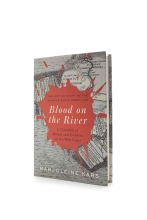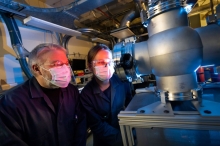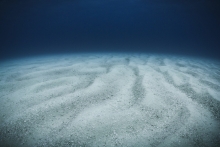
Marjoleine Kars wins 2021 Cundill History Prize
Marjoleine Kars has been named winner of the 2021 Cundill History Prize for Blood on the River: a Chronicle of Mutiny and Freedom on the Wild Coast (The New Press). Kars accessed a previously untapped Dutch archive to reveal the little-known story of a 1763 slave rebellion in Berbice, a Dutch colony in present-day Guyana.

Preventing “Alien” Invasions
The search of life beyond our world is an exciting venture that may yield an enormous discovery in the not-too-distant future. However, space agencies around the world, including NASA and the European Space Agency, have long been aware of the potential risks of biological contamination and have set in place planetary protection policies.

Lottery Tickets Aren’t Child’s Play
According to research, early childhood gambling experiences, including those with lottery products, increase the risk for developing gambling problems later in life.

Support for research in carbon-free energy storage and conversion
As the world reflects on pledges made at the United Nations climate conference (COP26) to reduce carbon emissions, and scientists develop new ways to scale up renewable energy, McGill University’s efforts to contribute to a cleaner, carbon-free future will take another big leap forward thanks to a $2-million donation from TD Bank Group (TD).

Synthetic tissue can repair hearts, muscles, and vocal cords
Combining knowledge of chemistry, physics, biology, and engineering, scientists from McGill University develop a biomaterial tough enough to repair the heart, muscles, and vocal cords, representing a major advance in regenerative medicine.

Extinct swordfish-shaped marine reptile discovered
A team of international researchers from Canada, Colombia, and Germany has discovered a new marine reptile. The specimen, a stunningly preserved metre-long skull, is one of the last surviving ichthyosaurs – ancient animals that look eerily like living swordfish.

$13 million in gifts will help transform McGill’s Leacock Building, support Indigenous research and knowledge
Donations totalling $13 million from McGill alumnus Gerald Rimer and the Rimer family will support a major renovation of the University’s Leacock Building and build the foundation for a future Institute for Indigenous Research and Knowledges (IIRK) at McGill.

Marine species in St.Lawrence Estuary endangered by rapid drop in levels of oxygen
Concentrations of dissolved oxygen in the deep waters of the Lower St. Lawrence Estuary (LSLE) have dropped by over 50% over the past two years. The consequences for many marine species, who depend on oxygen to survive, are potentially very serious. A compilation of historical data reveals that dissolved oxygen concentrations in the deep waters of the Lower St. Lawrence Estuary decreased by about 50% during the fifty years between 1934 and 1985.

Message from Principal and Vice Chancellor Suzanne Fortier on the importance of French at McGill University
Following this week's media reports, Principal and Vice-Chancellor Suzanne Fortier would like to clarify the situation regarding the importance of French at McGill University. Although McGill is an English-speaking institution of higher education, French holds a special place and the majority of the University's roughly 50,000 students and employees speak French.

Dopamine plays key role in songbird mating
In humans, the dopamine system has been tied to rewards and pleasurable sensations. As well as to memory and learning.

McGill University celebrates graduates and honorary doctorate recipients at fall convocation
This fall, 700 graduating students, who completed their programs at the end of Summer 2021 at McGill University, will cross the stage for the first time since the COVID-19 pandemic emerged in 2019. The four in-person fall convocation ceremonies will take place on November 25th and 26th, 2021 at Place des Arts, where graduates will celebrate together with family and friends.

Caucasian households in U.S. emit most carbon despite greater energy efficiency
Residential energy use represents roughly one-fifth of annual greenhouse gas emissions in the United States. A team of researchers led by McGill University has used data from 60 million individual American households to look into how carbon emissions caused by household energy use vary by race and ethnicity across the country.

The global ocean out of balance
Surprising as it sounds, all life forms in the ocean, from small krill to large tuna, seem to obey a simple mathematical law that links an organism’s abundance to its body size. For example, although small krill are individually only about one millionth of the weight of a large tuna, they also tend to be a million times more numerous throughout the oceans.

COVID-19 lockdowns deepened struggle for work-family balance
Around the world increasing mental health inequalities between women and men following the COVID-19 pandemic represent a major public health concern. According to a new study, the lockdown measures due to the pandemic profoundly and unequally disrupted the work-family balance for many graduate students, exacerbating mental health problems.

How to turn specific genes on and off
Type 1 diabetes, rheumatoid arthritis, and cancer are just some of the disorders associated with specific genes not “turning on” and “turning off” as they should.

